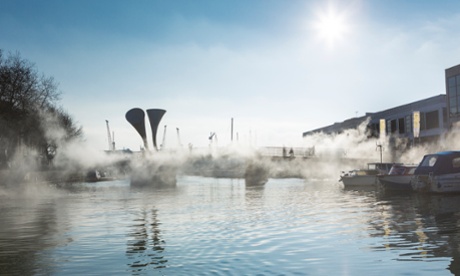
Storms, in their many guises, have been the theme of Bristol’s International festival, a weekend of performances and installations. The festival’s presence is visible in the heart of the city with Fujiko Nakaya’s Fog Bridge (continuing until 22 February). At regular intervals, clouds envelop the pedestrian harbour crossing Pero’s Bridge as if a sudden fog has descended. Observe up close, and delighted children chase trails of water vapour, dogs bark at the unexpected shift in temperature, even adults smile. Gaze from afar and the people crossing the bridge, chased by a creeping shroud of mist, look like eerie walking ghosts.
If Fog Bridge offers an immediate and visceral reminder of the disturbances brought about by climate change, then other pieces in the festival offer reflections on different kinds of storms, both cultural and personal. You don’t have to know anything about the 1980s vogueing drag balls of Harlem or the minimalist choreographer Yvonne Rainer to feel the thunderclaps echoing down the decades in Twenty Looks or Paris is Burning at the Judson Church (M)imosa.
Drawing from these seemingly opposing aesthetics with a cheeky exuberance, Trajal Harrell creates a wildly entertaining, cunningly crafted examination of culture, race, gender and visual and aural identities with an engaging cast of hypnotic dancers. It’s a dazzling reflection on illusion and reality, the constraints we face and the myriad possibilities for freeing ourselves.
Virginia Woolf drowned herself after filling her pockets with stones. In the quietly devastating Carrying Stones, Madeleine Botet de Lacaze’s hands out pebbles, reminding the audience that we all carry our own deaths around with us. She uses her own body as a canvas to project the weight that lures us into the watery depths. She lies on a pebbled shoreline like a beautiful, bleached corpse. She’s still breathing, as we are – just.

